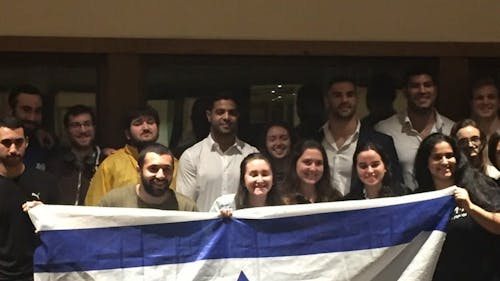Olympic Israeli judo team comes to Rutgers to discuss experiences with sport

On Tuesday, three members of the Olympic Israeli judo team came to Rutgers to speak about their experiences with the sport, as well as their diets and the challenges they faced while competing.
The event, which was organized by Scarlet Knights for Israel as well as the Jewish National Fund, began with each athlete discussing how they first became involved in judo.
“My story begins in Jerusalem,” said Or Sasson, an Olympic bronze medalist.
Sasson first tried judo when he was 9 years old because he was inspired by his brother. He said the sport made him a lot stronger, to the point where he competed in the 2016 Olympic Games in Rio de Janeiro. During one of the fights against an Egyptian judoka, he recalled how his opponent refused to shake his hand. This was a moment that not only hurt Sasson personally, but also went against the values he was taught when it came to the sport.
“Since I remember doing judo, the first thing I did right after a match is shake the hand of my opponent to show respect for him,” he said.
The Olympics made Sasson an overnight sensation. He said he went from virtually unknown to famous, especially considering how few Israeli Olympic medalists there were. His next goal is to continue competing at the Olympic games next year in Tokyo.
Peter Paltchick, another Israeli judoka who has won international awards, said he was actually born in Russia. He attributed his skills partially to the fact that he was born as a “big baby” at 5 kilograms, which is more than 11 pounds. When he was approximately 8 months old, he moved to Israel with his mother, but said he was mainly raised by his grandparents.
It was his grandfather, who was a Russian submarine officer, who encouraged him to do judo. Paltchick said that due to his grandfather, his role models growing up were fighters such as Bruce Lee and Jean-Claude Van Damme.
“I remember myself as a 5-year-old kid doing splits on chairs, it was crazy,” he said.
Sagi Muki, who also competed in the 2016 Olympic Games, said his judo journey began when he was 12 years old. Since he was an energetic kid, his mother always had to run after him in the house, so she sent him to judo to relieve the pent-up energy.
“It was love at first sight,” he said.
As the years went on, what started as a hobby for Muki became a professional sport. Being an Israeli athlete, though, had its challenges, as Muki recalled the difficulties of competing in Abu Dhabi — the capital of the United Arab Emirates — in 2015.
At Abu Dhabi, he said that it was clear that his team was not wanted, but he knew he needed to compete because it was an important competition before the Olympic games. He said that though it was hard navigating through security and the airport, he was proud to represent his country in the competition.
Muki also described his experience at the Olympics in Rio de Janeiro. A month before he was set to compete, he injured his back, which he said cost him valuable training time. While his other teammates were training twice a day, he had to visit doctors, go to physical therapy and get injections for his back. Though his doctors recommended he stay home and watch the Olympics from a television, Muki refused.
“I couldn’t think about it,” he said. “I decided I would do everything for myself to be there.”
At the Olympics, he ended up winning several matches all the way up to the semi-finals. His opponent was someone who he had defeated in the past, but at the Olympics, he ended up losing.
Following the talk, the three members were asked questions about their diets, the definition of judo and how they prepared mentally for the sport.
Sasson said especially since he was in the highest weight class, he had to eat more than 300 grams of protein a day, which usually meant eating one meal almost every hour. The three judokas also said that they were able to get their protein in by taking lots of supplements and drinking protein shakes.
When asked about how to prepare mentally, Muki said he was intimidated during the Olympic games when he realized that he would be going against one of the top judokas in the world.
“Judo is like a jungle. The moment you show weakness, you’re done,” he said.
Sasson said at this point, though, he expected the next Olympic games to be his last. He enjoys speaking to kids and teaching judo. He encourages them to pursue their dreams.
“I wanted to encourage and motivate the young kids to chase their dreams, to follow their hearts, because most of the young students just do the same things as everyone else,” he said. “Maybe they’re not thinking to do the things they really want to do.”



